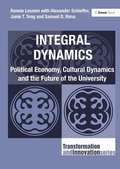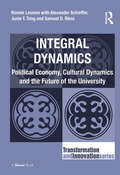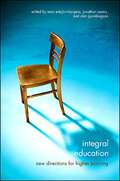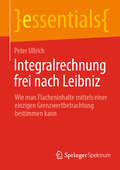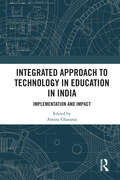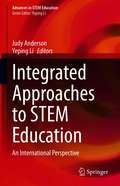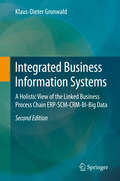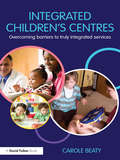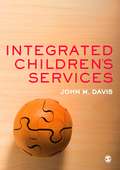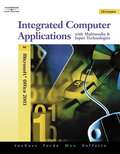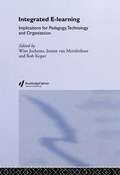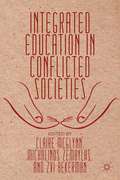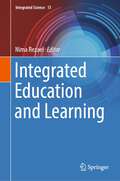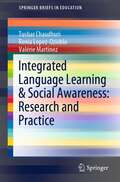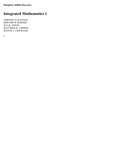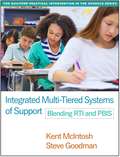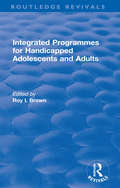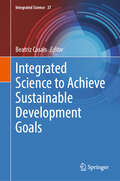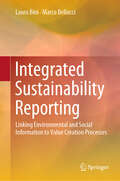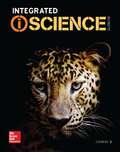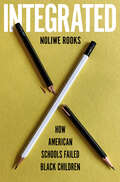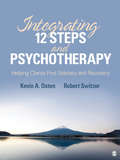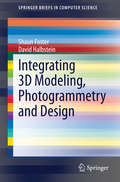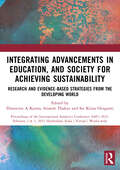- Table View
- List View
Integral Dynamics: Political Economy, Cultural Dynamics and the Future of the University
by Ronnie Lessem Alexander Schieffer Junie T. Tong Samuel D. RimaThe theory of integral dynamics is based on the view that the development of individual leaders or entrepreneurs requires the simultaneous development of institutions and societies. It seeks a specific way forward for each society, fundamentally different from, but drawing on, its past. Nearly every natural science has been transformed from an analytically-based approach to a dynamic one: now it is time for society and culture to follow suit locally and globally. Each culture, discipline and person is incomplete and is in need of others in order to develop and evolve.
Integral Dynamics: Political Economy, Cultural Dynamics and the Future of the University (Transformation and Innovation)
by Ronnie Lessem Alexander Schieffer Samuel D. RimaThe theory of integral dynamics is based on the view that the development of individual leaders or entrepreneurs requires the simultaneous development of institutions and societies. It seeks a specific way forward for each society, fundamentally different from, but drawing on, its past. Nearly every natural science has been transformed from an analytically-based approach to a dynamic one: now it is time for society and culture to follow suit locally and globally. Each culture, discipline and person is incomplete and is in need of others in order to develop and evolve. This book sets out a curriculum for a new integral, trans-cultural and trans-disciplinary area of study, inclusive of, but extending beyond, economics and enterprise. It embraces a trans-personal perspective, linking self with community, enterprise and society, and focusing on the vital relationship between local identity and global integrity. For the government policy maker, the enlightened business practitioner, and the student and researcher into economics and enterprise, the new discipline is set out here in complete detail by a multi-national team of Gower's Transformation and Innovation Series authors. Illuminated with examples relating the conceptual to the practical, this is a text, not for a pre-modern, modern, or even post-modern era, but for what has been called our trans-modern age.
Integral Education: New Directions for Higher Learning (SUNY series in Integral Theory)
by Olen Gunnlaugson Sean Esbjörn-Hargens Jonathan ReamsThe educational challenges being faced today are driving us toward a new step in the evolution of educational theory and practice. Educators are called to go beyond simply presenting alternatives, to integrating the best of mainstream and alternative approaches and taking them to the next level. Integral Education accomplishes this by bringing together leading researchers and practitioners from higher education who are actively exploring the frontiers of education from an integral perspective. It presents an overview of the emerging landscape of integral education from a variety of theoretical and applied perspectives. Key characteristics of integral education include: exploring multiple perspectives, employing different pedagogical techniques (e.g., reflective, dialogical, empirical), combining conceptual rigor with embodied experience, drawing on developmental psychology, and cultivating a reflective and transformative space for students and teachers alike. Integral Education provides the most comprehensive synopsis of this exciting new approach and serves as a valuable resource for any integral effort within education.
Integralrechnung frei nach Leibniz: Wie man Flächeninhalte mittels einer einzigen Grenzwertbetrachtung bestimmen kann (essentials)
by Peter UllrichIn einem Manuskript aus dem Jahre 1676 behandelt Gottfried Wilhelm Leibniz (1646–1716) die Integration monotoner Funktionen. Hieraus lässt sich eine Integrationstheorie entwickeln, mittels derer man alle in der Schule verwendeten Basisfunktionen integrieren und allgemeine Integrationsregeln herleiten kann. Im Gegensatz zu dem üblichen formalen Zugang benötigt diese Theorie nur einen propädeutischen Grenzwertbegriff, wie er in den KMK-Bildungsstandards gefordert wird; letztlich reicht eine einzige Grenzwertbetrachtung aus. Zudem wird die Integralrechnung nicht auf eine Umkehrung der Differentialrechnung reduziert.
Integrated Approach to Technology in Education in India: Implementation and Impact
by Amina CharaniaThis book explores the evolution of Integrated approach to Technology in Education (ITE), an initiative of Tata Trusts in India, and the many innovative ways in which it has helped enrich the learning process and fostered new skills for young people, especially those living in challenging environments. The book offers an in-depth look into authentic, creative and project-based learning experiences that have been facilitated by using technology in education in different settings in India, with case studies about opportunities and challenges of implementing ITE in the tribal pockets of West Bengal and Maharashtra, madrasas in West Bengal, government schools in rural Assam and sites in Uttar Pradesh. It examines the viability and sustainability of using ITE and other digital methods to address the complex education needs of children and address the challenges in the professional development of teachers. It also highlights the creative use of inquiry, project-based collaborative learning and distance education technologies during the pandemic in government-run schools. This book will be of interest to teachers, students and researchers of education, education technology, ICT and education, digital education and information technology. It will also be useful for educators, policymakers, educational institutions, EdTech start-ups and NGOs in the education sector.
Integrated Approaches to STEM Education: An International Perspective (Advances in STEM Education)
by Yeping Li Judy AndersonThis book provides a platform for international scholars to share evidence for effective practices in integrated STEM education and contributes to the theoretical and practical knowledge gained from the diversity of approaches. Many publications on STEM education focus on one or two of the separate STEM disciplines without considering the potential for delivering STEM curriculum as an integrated approach.This publication analyzes the efficacy of an integrated STEM curriculum and instruction, providing evidence to examine and support various integrations. The volume focuses on the problems seen by academics working in the fields of science, technology, engineering and mathematics (STEM) and provides valuable, high quality research outcomes and a set of valued practices which have demonstrated their use and viability to improve the quality of integrated STEM education.
Integrated Business Information Systems: A Holistic View of the Linked Business Process Chain ERP-SCM-CRM-BI-Big Data
by Klaus-Dieter GronwaldEnterprise Resource Planning (ERP), Supply Chain Management (SCM), Customer Relationship Management (CRM), Business Intelligence (BI) and Big Data analytics (BDA) are business related tasks and processes, which are supported by standardized software solutions. The book explains that this requires business-oriented thinking and acting from IT specialists and data scientists. It is a good idea to let students experience this directly from the business perspective, for example as executives of a virtual company in a role-playing game. The second edition of the book has been completely revised, restructured and supplemented with actual topics such as blockchains in supply chains and the correlation between Big Data analytics, artificial intelligence and machine learning. The structure of the book is based on the gradual implementation and integration of the respective information systems from the business and management perspectives. Part I contains chapters with detailed descriptions of the topics supplemented by online tests and exercises. Part II introduces role play and the online gaming and simulation environment. Supplementary teaching material, presentations, templates, and video clips are available online in the gaming area. The gaming and business simulation Kdibisglobal.com, newly created for this book, now includes a beer division, a bottled water division, a soft drink division and a manufacturing division for barcode cash register scanner with their specific business processes and supply chains.
Integrated Children's Centres: Overcoming Barriers to Truly Integrated Services
by Carole BeatyDesigned to be a one-stop-shop to meet the needs of local communities, Children’s Centres represent a revolutionary shift in the way children’s services are delivered to families. Integrated Children’s Centres looks at the way in which Children’s Centre development has built upon the research and experiences of initiatives such as the HeadStart programme in America and the SureStart programme. Exploring the component elements of truly integrative services and the key players in ensuring positive outcomes: families, the local authority, PCT, private and voluntary sectors, and faith groups, this book covers: the challenges faced by children’s centres how to tackle social issues through the medium of children's centres achieving effective multi-agency working and true collaboration the essentials of leading and managing children’s centres the benefits of early intervention how to effectively deliver health care, education and children’s services. Providing a wealth of case studies, this highly topical book will be of interest to nursery and children’s centres managers and early years practitioners enrolled on the NPQICL or EYPS programmes, as well as students working towards a degree in Early Childhood Studies or MA in Early Years.
Integrated Children's Services
by John M. DavisWorking together with fellow professionals across different sectors of children’s services is central to good practice for all those who work with children and young people. This book looks at how children’s services can work together more effectively; by taking an approach that is grounded in research, the book engages critically with both the benefits and the pitfalls of integrated working. The book encourages the reader to reflect on their own background and how this influences their view of specific children, families and fellow professionals, as well as their own practice. Suitable for all those working with children and young people from Birth to 19 in any aspect of children’s services, this book will ensure professionals work together successfully to the benefit of all.
Integrated Computer Applications With Multimedia And Input Technologies
by Connie M. Forde Donna L. Woo Linda Hefferin Susie VanHussIntegrated E-Learning: Implications for Pedagogy, Technology and Organization (Open and Flexible Learning Series)
by Rob Koper Jeroen Van Merriënboer Wim JochemsIt is widely recognized that online and e-learning is no longer an exclusive approach used only in distance education and in isolation from traditional education programmes. A real difficulty facing educators and trainers is how to integrate these new learning methods and embed them in established and existing forms of learning, teaching or training. This book forms a serious, in-depth study of the subject and proposes that e-learning is not simply a matter of 'digitizing' traditional materials, but involves a new approach, which must take into account pedagogical, technological and organizational features to form a well-designed education system. A practical focus is maintained throughout, with advice on implementation and case studies drawn from the contributors' considerable experience.Integrated E-Learning is essential reading for anyone wanting to implement, design, develop or deliver e-learning or training courses.
Integrated Education In Conflicted Societies
by Michalinos Zembylas Zvi Bekerman Claire McglynnAcademics and practitioners examine the developing field of integrated education in conflicted societies, where children who would normally be educated apart are deliberately educated together. They draw on a range of theoretical and practical frameworks, providing numerous case studies from Northern Ireland, Israel, Macedonia, and Cyprus.
Integrated Education and Learning (Integrated Science #13)
by Nima RezaeiIntegrated Education and Learning aims to discuss novel approaches to offer integrated educational methods. Within the last few years, educational techniques have evolved to favour critical thinking and improve learning skills. This volume links thinking and learning in educational settings and discusses diverse mechanisms that influence this association; including meta-cognitive capacity, memory, cognitive style, conceptual approaches, digitalization, teaching approaches, echoing, and questioning. It embraces this discussion at all levels, from early childhood education to higher education. This book also includes teaching tips for creating a learning environment that cultivates students’ creativity and critical thinking on both online platforms and live-in-classroom. The book follows discussing the merits of an integrated educational paradigm that will help develop highly intellectual thinkers and will promote modern values to face current and future challenges. Finally, the book shows a balance between learning and education to enhance creativity, critical thinking and social skills.
Integrated Language Learning & Social Awareness: Research and Practice (SpringerBriefs in Education)
by Tushar Chaudhuri Renia Lopez-Ozieblo Valérie MartinezThis book reports on and analyses the Integrated Language Learning & Social Awareness Project, a unique project in the field of Foreign Language Learning and Telecollaboration till now in the world. It takes the existing research on telecollaborative learning, content and language integrated learning and e-learning and combines them into one coherent concept in which language acquisition and enhancement takes place through task-led research on the specific issue of “Healthy Cities” by targeting language learners from around the world. The book delivers insights into the planning and the development of the project including collaborative task design and its underlying theoretical and research frameworks. It then goes on to reflect on how these underlying frameworks are developed further to broaden the existing paradigms of research in the field of telecollaborative language learning.
Integrated Math 1: Student Edition 2015 (HMH Integrated Math 1)
by Timothy D. Kanold Edward B. Burger Juli K. Dixon Steven J. Leinwand Matthew R. LarsonIntegrated Multi-Tiered Systems Of Support: Blending Rti And Pbis (The Guilford Practical Intervention In The Schools)
by Steve Goodman Kent McIntoshMany schools have implemented academic response to intervention (RTI) and schoolwide positive behavioral interventions and supports (PBIS) as separate initiatives. This book provides keys to making these programs more effective, seamless, efficient, and sustainable by combining them into a single multi-tiered system of support (MTSS). Steps and strategies are outlined for integrating data structures, practices, teams, and district systems. Contributing authors present detailed case examples of successful MTSS implementation in three states. In a large-size format with lay-flat binding, the book features 27 reproducible checklists and evaluation tools. Purchasers get access to a companion website where they can download and print the reproducible materials plus other helpful resources. <p><p> This book is in The Guilford Practical Intervention in the Schools Series, edited by T. Chris Riley-Tillman.
Integrated Programmes for Handicapped Adolescents and Adults
by Roy I. BrownFirst published in 1984, Integrated Programmes for Handicapped Adolescents and Adults explores the need to develop integrated programmes for adolescents and adults with developmental disabilities. Whilst the training models and concepts examined largely relate to formal areas of education, such as reading, mathematics, and writing, the book also pays close attention to social education skills, including home management, budgeting, meal preparation, and the development of positive familial relationships. Integrated Programmes for Handicapped Adolescents and Adults presents a number of projects from different parts of the world, with an emphasis on linking research and practice.
Integrated Science to Achieve Sustainable Development Goals (Integrated Science #37)
by Beatriz CasaisThe book &‘Integrated Science to achieve Sustainable Development Goals&’ debates how different fields of study can confront or mitigate problems or contribute together to the development of society. In brief, it is a book about the interdisciplinarity of knowledge surrounding the topics in society that are involved in the world development agenda. There is an increasing recognition of the importance of achieving the sustainable development goals (SDGs) set in the UN agenda 2030. The book seeks to address the need for the integration of multidisciplinary fields of knowledge to achieve the seventeen SDGs. The book was developed with contributions from established and well-known scholars in different fields. It is interdisciplinary in nature and international in scope, intending to bring out a collection of state-of-the-art/cutting-edge knowledge on policies to achieve the 17 SDGs as well as a range of actionable recommendations for future developments in the different fields with the purpose of addressing the Agenda 2030. The integration of different disciplines (including sociology, health, education, psychology, business, economics, political science, environmental studies and urban planning) in a complex problem like societal development gives this book the challenge to be an authoritative tool with guidelines for the entire community and for policymakers as well. Each chapter presents the state of the art of a topic considered important to achieve SDGs. The authors explain how their field contributes to the achievement of one or more SDGs, including the main theories and examples of empirical evidence that may guide society in using such knowledge to contribute to societal impact.
Integrated Sustainability Reporting: Linking Environmental and Social Information to Value Creation Processes
by Marco Bellucci Laura BiniThis book proposes an integrated approach to sustainability reporting, the goal being to overcome certain limitations of the well-established additive approach, where the reporting of environmental, social and economic issues is sequential, but separate. It argues that, in order to successfully communicate its commitment to sustainability, a company should report on how environmental and social issues impact its way of doing business, namely its business model, contributing to value creation. Thus, a reporting framework for business models that encompasses sustainability is presented. In turn, a number of illustrative examples are examined to show how business model reporting could be optimally used to provide effective and integrated sustainability reporting. The book also offers a broad analysis of corporate sustainability reporting, which includes a discussion of the theoretical background, an explanation of why companies provide sustainability reporting, a description of the current regulatory framework for sustainability disclosure, and a review of sustainability reporting literature that shows the main characteristics of sustainability disclosure practices. Given its scope, the book will be of interest to all researchers and practitioners working for companies or organizations that aim to support, implement and improve their sustainability reporting, by adopting a more integrated approach that interconnects environmental and social aspects with the economic and financial results via the business model. The book also offers a valuable reference guide for social science researchers, including PhD students, interested in a discussion of the latest literature on sustainability, corporate social responsibility, and the communication of business models.
Integrated iScience: Course 2 (Integrated Science Series)
by McGraw-HillIntegrated iScience print student edition.
Integrated: How American Schools Failed Black Children
by Noliwe RooksA powerful, incisive reckoning with the impacts of school desegregation that traces four generations of the author&’s family to show how the implementation of integration decimated Black school systems and did much of the Black community a disserviceOn May 17, 1954 the landmark case Brown v. Board of Education determined that racial segregation in schools was unconstitutional. Heralded as a massive victory for civil rights, the decision's goal was to give Black children equitable access to educational opportunities and clear a path to a better future. Yet in the years following the ruling, schools in predominantly Black neighborhoods were shuttered or saw their funding dwindle, Black educators were fired en masse, and Black children faced discrimination and violence from their white peers as they joined resource-rich schools that were ill-prepared for the influx of new students.Award-winning interdisciplinary scholar of education and Black history Noliwe Rooks weaves together sociological data and cultural history to challenge the idea that integration was a boon for Black children. She tells the story of her grandparents, who were among the thousands of Black teachers fired following the Brown decision; her father, who was traumatized by his experiences at an almost exclusively-white school; her own experiences moving from a flourishing, racially diverse school to an underserved inner-city one; and finally her son and his Black peers, who over half-century after Brown still struggle with hostility and prejudice from white teachers and students alike. She also shows how present-day discrimination lawsuits directly stem from the mistakes made during integration.At once assiduously researched and deeply engaging, Integrated tells the story of how education has remained both a tool for community progress and a seemingly inscrutable cultural puzzle. Rooks' deft hand turns the story of integration's past and future on it's head, and shows how we may better understand and support generations of students to come.
Integrating 12-Steps and Psychotherapy: Helping Clients Find Sobriety and Recovery
by Kevin A. Osten Robert J. SwitzerIntegrating 12 Steps and Psychotherapy: Helping Clients Find Sobriety and Recovery presents a practical and applied approach to working with substance dependent clients. Designed to be accessible to a wide and multidisciplinary audience of helpers at all skill levels, this text helps future practitioners fully understand the clinical challenges with substance dependence, adjust their thinking and technique in order to match their client's phase of recovery, and optimize client retention and treatment outcomes. Utilizing educator, training, and practice perspectives, authors Kevin A. Osten and Robert Switzer explore relevant theory and techniques in integrating 12-Steps across a broad range of clinical issues including: the assessment and treatment of resistant and ambivalent pre-recovery clients; boundary setting, undoing antisocial adaption; processing counter transference reactions; and the intersection between biological functioning and ability in early recovery.
Integrating 3D Modeling, Photogrammetry and Design
by Shaun Foster David HalbsteinThis book looks at the convergent nature of technology and its relationship to the field of photogrammetry and 3D design. This is a facet of a broader discussion of the nature of technology itself and the relationship of technology to art, as well as an examination of the educational process. In the field of technology-influenced design-based education it is natural to push for advanced technology, yet within a larger institution the constraints of budget and adherence to tradition must be accepted. These opposing forces create a natural balance; in some cases constraints lead to greater creativity than freedom ever can - but in other cases the opposite is true. This work offers insights into ways to integrate new technologies into the field of design, and from a broader standpoint it also looks ahead, raising further questions and looking to the near future as to what additional technologies might cause further disruptions to 3D design as well as wonderful creative opportunities.
Integrating Aboriginal Perspectives Into the School Curriculum
by Yatta KanuFrom improved critical thinking to increased self-esteem and school retention, teachers and students have noted many benefits to bringing Aboriginal viewpoints into public school classrooms. In Integrating Aboriginal Perspectives Into the School Curriculum, Yatta Kanu provides the first comprehensive study of how these frameworks can be effectively implemented to maximize Indigenous students' engagement, learning, and academic achievement. Based on six years of empirical research, Kanu offers insights from youths, instructors, and school administrators, highlighting specific elements that make a difference in achieving positive educational outcomes. Drawing on a wide range of disciplines, from cognitive psychology to civics, her findings are widely applicable across both pedagogical subjects and diverse cultural groups. Kanu combines theoretical analysis and practical recommendations to emphasize the need for fresh thinking and creative experimentation in developing curricula and policy. Amidst global calls to increase school success for Indigenous students, this work is a timely and valuable addition to the literature on Aboriginal education.
Integrating Advancements in Education, and Society for Achieving Sustainability: Research and Evidence-Based Strategies from the Developing world
by Sai Kiran Oruganti Dimitrios A. Karras Srinesh ThakurThis book is the collection of selected articles that appeared at the First International Analytics Conference 2023 held in Hyderabad in virtual mode on February 2nd the 3rd 2023. In an era defined by the twin imperatives of knowledge and sustainability, this compelling volume explores the powerful synergy between advancements in education and the transformation of society towards a more sustainable future. Delve into the heart of progress as educators, innovators, and change-makers come together to catalyze positive change. Within these pages, you’ll witness the transformative potential of education as it equips individuals with the skills, knowledge, and perspectives necessary to address the multifaceted challenges of sustainability. Discover groundbreaking pedagogical approaches, innovative technologies, and visionary programs that are revolutionizing learning and inspiring the next generation of leaders.Simultaneously, the book sheds light on the interconnected relationship between education and society, illustrating how an informed and engaged citizenry is driving sustainable practices, community resilience, and global change. From eco-conscious urban planning to social entrepreneurship, it showcases the societal initiatives that emerge when education and sustainability combine forces.‘Integrating Advancements in Education and Society for Achieving Sustainability’ is a compass for those navigating the path towards a brighter, more sustainable future. Join us in this thought-provoking exploration of how education and society are jointly shaping the way we think, act, and work together to achieve a harmonious balance with the world around us.
